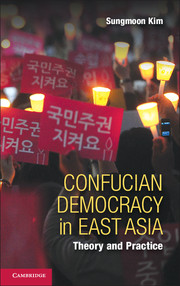Book contents
- Frontmatter
- Dedication
- Contents
- Acknowledgments
- Introduction
- Part I Beyond Thick Confucian Communitarianism and Meritocratic Elitism
- Part II Confucian Democracy in Theory – A Pluralist Reconstruction
- 4 Value Pluralism and Confucian Democratic Civil Society
- 5 Confucian Familialism and Public Reasoning
- 6 In Defense of Confucian Democratic Welfarism
- 7 Rethinking Political Meritocracy: Selection Plus Two
- Part III Confucian Democracy in Practice – The Korean Case
- Bibliography
- Index
- References
4 - Value Pluralism and Confucian Democratic Civil Society
Published online by Cambridge University Press: 05 June 2014
- Frontmatter
- Dedication
- Contents
- Acknowledgments
- Introduction
- Part I Beyond Thick Confucian Communitarianism and Meritocratic Elitism
- Part II Confucian Democracy in Theory – A Pluralist Reconstruction
- 4 Value Pluralism and Confucian Democratic Civil Society
- 5 Confucian Familialism and Public Reasoning
- 6 In Defense of Confucian Democratic Welfarism
- 7 Rethinking Political Meritocracy: Selection Plus Two
- Part III Confucian Democracy in Practice – The Korean Case
- Bibliography
- Index
- References
Summary
Larry Diamond, a renowned political scientist, points to pluralism as one of the defining features of democratic civil society. He says, “To the extent that an organization, such as a religious fundamentalist, ethnic chauvinist, revolutionary or millenarian movement, seeks to monopolize a functional or political space in society, crowding out all competitors while claiming that it represents the only legitimate path, it contradicts the pluralistic and market-oriented nature of civil society.” In this brief statement, we find three important points about the nature of democracy and democratic civil society: (1) liberal pluralism is integral to democratic civil society, (2) the center of pluralism is the market, and (3) at the center of pluralism is the plurality of material interests. In fact, many political scientists now widely agree that the democratic movements in Central and Eastern Europe, even if galvanized by the mass public’s anticommunist and procapitalistic spirit in civil society, occasionally faced difficulty transforming the national, ethically charged, civil society into various kinds of interest-based liberal pluralistic civil societies. For instance, Juan Linz and Alfred Stepan understand the most profound challenge to Polish democratic consolidation precisely in terms of the difficulty of liberal pluralism. “Ethical civil society represents ‘truth,’ but political society in a consolidated democracy normally represents ‘interest.’ In political society the actor is only seldom the ‘nation,’ the more routinely ‘groups.’ ‘Internal differences’ and ‘conflict’ are no longer to be collectively suppressed, but organizationally represented in political society. Compromise and institutionalization are no longer negative but positive values.” Undoubtedly, pluralism is at the core of modern civil society, but the empirical political scientists’ understanding of pluralism as plurality of material interest is significantly limited for the following two reasons. First, liberal pluralism in political science completely dismisses Hannah Arendt’s insight that what is really meaningful is the plurality of the selves (or human beings). In this regard, empirical political scientists make a critical mistake by understanding the core of the individual self solely in terms of material interest. Such a view is what (Nozickean) libertarianism champions, but libertarianism hardly represents the entire liberal tradition, and it certainly does not offer the best case of liberal pluralism. Second, empirical political scientists fail to appreciate Max Weber’s insight that there are two categorically different kinds of “interest” – material interest and so-called ideal interest.
- Type
- Chapter
- Information
- Confucian Democracy in East AsiaTheory and Practice, pp. 101 - 127Publisher: Cambridge University PressPrint publication year: 2014

